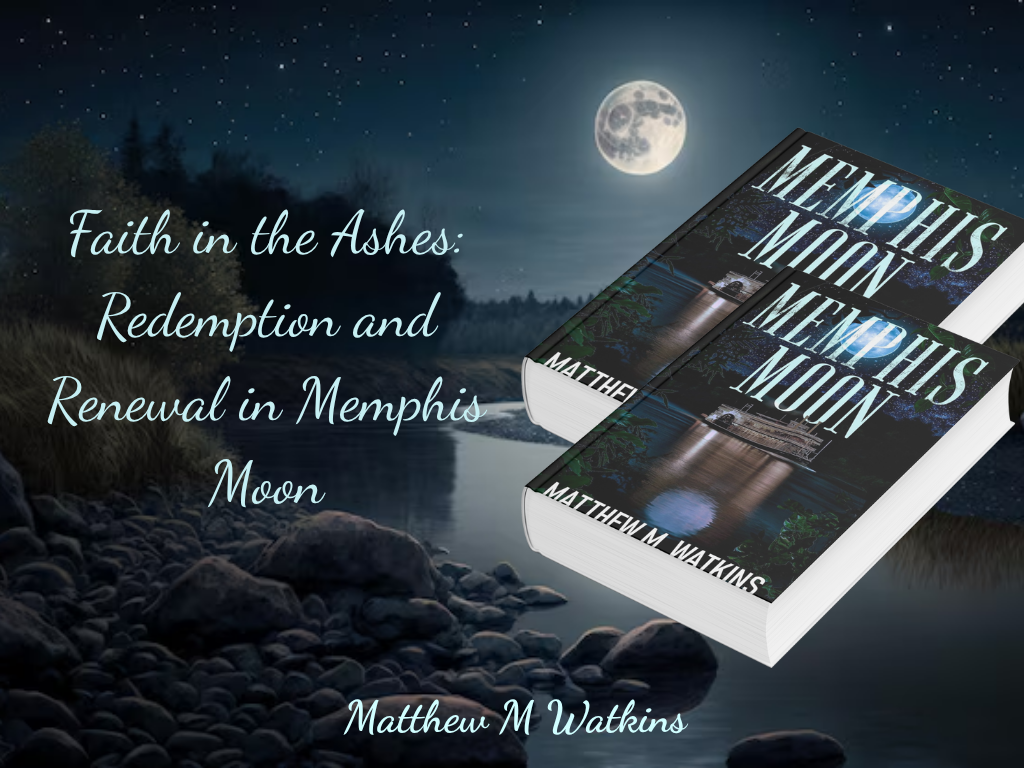In Memphis Moon, Matthew M. Watkins turns faith and redemption into living forces rather than abstract ideals. They’re not doctrines to be preached, but human experiences to be felt, quiet, unsteady, and often born from pain. Through Caleb Dawkins, Ginnie Moon, and Lottie Moon, Watkins explores what it means to believe again when everything sacred has been torn apart.
Faith in Watkins’s novel isn’t about certainty. It’s about survival. The Civil War leaves behind more than physical ruin; it leaves spiritual wreckage. In that emptiness, his characters grope for light, not out of piety, but out of need. Caleb, once defined by anger and grief, begins to rebuild his father’s mill, not as an act of defiance, but as a kind of prayer. Every beam raised, every stone laid becomes a step toward forgiveness. Watkins doesn’t write this work as triumph; he writes it as quiet redemption, one that grows in the soil of loss.
Ginnie Moon’s faith takes a different shape, one rooted in love and endurance. It is through Ginnie’s diary that we see a woman who is consistently wrestling with her conscience, her heart, and her supposed duty. Her prayers and wants are not always answered, but she still continues to go through them, to hope for them, and to believe in them with a faithful persistence. That persistence becomes her strength. For Ginnie, faith is not blind loyalty to a cause or creed; it’s the courage to keep believing in goodness, even when the world seems undeserving of it.
Lottie Moon, whose mission work extends beyond the war, embodies faith in action. She lives what she believes, teaching, nurturing, and giving until her life becomes a form of devotion. Watkins’s portrayal of Lottie is not idealized; it’s deeply humane. Her sacrifices come with exhaustion, her compassion with cost. Yet through her, the novel shows that redemption isn’t always found in dramatic revelation. Sometimes it’s in service, in the simple, steadfast acts of care that rebuild the human spirit one person at a time.
What binds these three lives together is Watkins’s unshakable belief that redemption begins with empathy. Forgiveness is not granted from above; it grows between people. Caleb learns to forgive through love. Ginnie forgives through remembrance. Lottie forgives through giving. Their faith is not uniform, but it’s shared, each expression of it reaching toward something greater than grief.
Watkins’s tone reinforces this theme. There are no sermons, no moral pronouncements. His language stays humble, grounded in daily experience, the smell of wood smoke, the hush of prayer, the weight of a diary resting in someone’s hands. Through these details, Watkins reminds readers that faith often lives in the ordinary, that redemption happens quietly, long before it’s recognized.
The modern writer who discovers Ginnie’s diary becomes part of that same spiritual lineage. Her curiosity turns into reverence; her reading becomes a kind of devotion. She doesn’t resurrect faith through religion but through remembrance, through the simple act of listening to a voice from the past. In doing so, she experiences the same awakening Watkins’s historical characters did: the realization that love and forgiveness are forms of faith, too.
By the end of Memphis Moon, redemption doesn’t come as a grand conclusion. It arrives as understanding, as acceptance that pain and grace are inseparable. Watkins allows his characters to be flawed, their faith incomplete, their redemption ongoing. That honesty is what makes their journeys so moving.
The mill turns again. The diary is read. The Moon sisters’ names are remembered. These moments, small as they are, become acts of resurrection. Through them, Watkins gives his readers a faith that is not about dogma, but about endurance, the belief that even after devastation, life and love can still begin again.
Memphis Moon ends where true faith often begins: not in certainty, but in hope. In the stillness after war, amid ashes and silence, Watkins leaves us with a vision of grace that feels wholly earned, fragile, human, and infinite.

